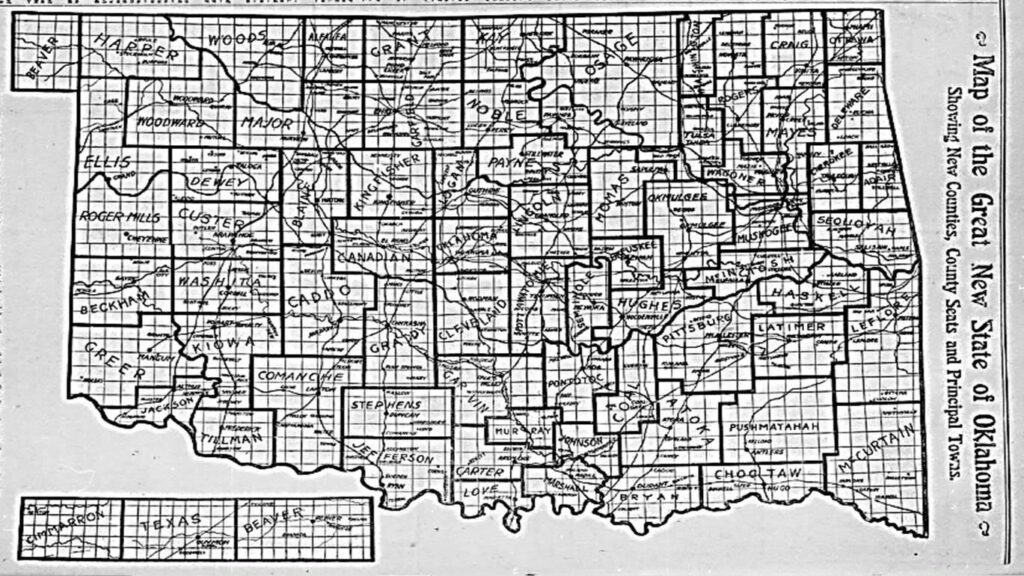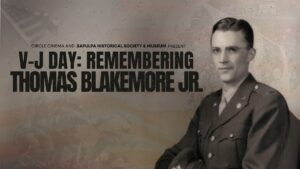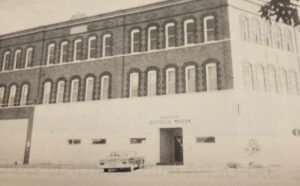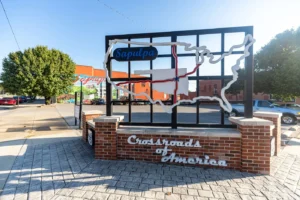Rachel Whitney, Curator
Sapulpa Historical Museum
On November 14, 1907, the Sapulpa, Indian Territory newspaper, The Union News, announced when Oklahoma would be signed into legislation by President Theodore Roosevelt. At 10:16 AM, in Washington D.C. (or 9:16 AM in Sapulpa), on November 16, 1907, Oklahoma became the 46th State.
Unfortunately, all our local papers (Sapulpa and Tulsa) are missing the exact announcement and celebration at the time of the statehood. However, both Oklahoma City and Guthrie newspapers announced this: “The president used in affixing his signature to the document a pen made from a quill of an American eagle, which now is alive, in captivity at Woodward, Okla. A quill from the wing of this same eagle was used when the president signed the statehood act. This pen will go to the Oklahoma Historical Society…A new star was added to the American flag today by the admission formally into the Union of the state of Oklahoma…Oklahoma Settled in Union. Forty-Sixth Star on Flag…”
Inauguration and Statehood celebration was thrown together in one large event. Charles Haskell was officially signed as Governor of Oklahoma, the new state. The year before, Haskell held a meeting with Oklahoma Constitutional Convention and appointed members to designate county boundaries. Oklahoma Territory already had counties; Indian Territory did not.
When a proposal was brought to the floor in late 1906, the map showed Bristow as the county seat for Moman County (originally named after a 1906 delegate for the Oklahoma Constitutional Convention Moman Pruitt). In haste, it was approved before the county members had a chance to counter.
When the Convention met again in January 1907, the discrepancy between Bristow and Sapulpa being the county seat was discovered. Tulsa backed Bristow, but an appeal had already begun by Sapulpa. The convention voted 49 to 29 in favor of Sapulpa. However, it was also stated that when Oklahoma would become a state, cities could file a petition and hold an election to change county seats.
This would be only the beginning. The Sapulpa Light ran several columns on how “rotten” the Tulsa papers had become. One reported a petition circulating in Moman County to move the county seat to Kiefer. The petition stated the “war between Sapulpa and Bristow would be greater than ‘Bloody Kansas’ before the Civil War”. Other papers had several outlandish proposals. An article from Tulsa ran a statement to tear down Sapulpa.
Sapulpa Light shared a map of the state showing the counties with their county seats. Moman County (shown on the map as “Momas”) was smaller on the map than it was finally configured. Within the next couple of months, the Convention had changed the county’s name from Moman to Creek. The reason given was that the Creek Native Americans wanted a county named after their tribe. The Bristow Record newspaper reported that Moman Pruitt had supported Lee Cruce for governor, and not Charles Haskell.

In making a case for Bristow being county seat, Bristow would from time to time show how Sapulpa was unfit to be county seat. A Bristow article on November 22, 1907 reported how degenerate Sapulpa was. It stated the saloons were operating wide open in the “Capital” of Creek County. “The difference between Sapulpa and Oklahoma Territory was that the beer costs 15 cents in Oklahoma Territory, and 25 cents in Sapulpa. Saloons were not taking any precautions to hide their flaunting of the law.”
On February 7, 1908, Bristow newspaper reported that C.D. Gelwick, a prominent figure in the county seat fight, had been attacked while visiting Sapulpa. The story was picked up by Tulsa, and Sapulpa acted quickly. Sapulpa papers ran that the author of these stories were either “a humorist, a damn fool, or both.”
By July 1908, Bristow and Sapulpa began collecting votes again. Both towns selected members in their prominent black communities to cast votes. The basic arguments were that if people support Bristow, Bristow would build a black school and Sapulpa would not. Others shouted that it was about money, labor, homes, and businesses that would be greatly impacted if Sapulpa lost.
The basic arguments used by both cities were that Bristow was located near the geographical center of the county, and Sapulpa was the center of the most population. Both arguments used were true.
In August 1908, it was announced that Sapulpa had won the county seat by 554 votes. The Tulsa World ran an article congratulating Sapulpa on its victory.
More on County Seat: However, this fight was not over. The following month, September 1908, Bristow held a petition to overturn the election stating there were irregularities in registration. The petition contended that men from Tulsa and Okmulgee Counties were permitted to vote.
This would continue for six more years; a repeated cycle of annual voting and petitioning. Every year until 1913, Creek County held a vote for the county seat. There had been two presidential elections (William Taft in 1908 to Woodrow Wilson in 1912), many vicious accusations, and countless court battles. At one point after the Supreme Court rulings, Bristow had thought of creating another county; splitting Creek County into two (Bristow even came up with a name for their own county: Oil County).
Elections, petitions, and other important dates are as follows:
- May 5, 1909 (Bristow petitions and calls for re-vote);
- June 10, 1909 (Governor Haskell call for an election);
- July 10, 1909 (Sapulpa begins campaigning; and L.B. Jackson buys the Kiefer Searchlight after paper comes out in favor of Bristow);
- August 10, 1909 (election held and Sapulpa wins);
- September 8, 1909 (Bristow files suit);
- February 25, 1910 (Judge C.H. Parker named referee);
- March 16, 1910 (another case begins);
- August 17, 1910 (case ends with over 2,000 pages of testimony);
- February 18-19, 1911 (oral arguments presented);
- July 12, 1911 (Judge Parker finds Sapulpa guilty on all charges but rules that by even throwing out those votes, Sapulpa still the winner);
- April 2, 1913 (Bristow files suit contesting the ruling and asks for new election);
- June 25, 1913 (Supreme Court orders another election).
Sapulpa finally won the county seat fight, officially, August 1, 1913.
For more information on Oklahoma Statehood, visit the Oklahoma Historical Society website for “Statehood Movement”: https://www.okhistory.org/publications/enc/entry.php?entry=ST025







